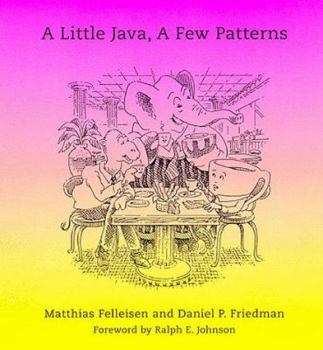A Little Java, a Few Patterns
Select Format
Select Condition 
Book Overview
Java is a new object-oriented programming language that was developed by Sun Microsystems for programming the Internet and intelligent appliances. In a very short time it has become one of the most widely used programming languages for education as well as commercial applications. Design patterns, which have moved object-oriented programming to a new level, provide programmers with a language to communicate with others about their designs. As a result,...
Format:Paperback
Language:English
ISBN:0262561158
ISBN13:9780262561150
Release Date:December 1997
Publisher:MIT Press
Length:194 Pages
Weight:2.75 lbs.
Dimensions:0.5" x 7.0" x 9.1"
Age Range:18 years and up
Grade Range:Postsecondary and higher
Customer Reviews
5 ratings
Not A Book For The Short-Sighted
Published by Thriftbooks.com User , 23 years ago
This book does not take the route of other Java books. Instead of trying to cover not only the basics of Object-Oriented Development, UML, Java syntax, and it's extensive library of functions, all with their own argot, this book approaches programming from a completely different angle. The book is easy to read, and is in a open, playful tone. Because the book is written in the Socratic method of question and answer, with each question and answer building on the last question and answer, the concepts are covered in a natural manner, that is easy to follow. As an example, before you even know that you have covered Abstract classes, and the benefits of poly-morphism in Java programming, you have seen it in action, and why it's beneficial. Situations like this abound, and broaden your deeper understanding of Java. If you're looking for a quick book to learn the syntax of Java, or something to cover the basics of the class libraries, stay away. If you want to know Java on a much deeper level, and be extension, programming on a deeper level, but this book.
Simply Brilliant
Published by Thriftbooks.com User , 25 years ago
There are really only a few ideas in object oriented programming, but this is often obscured by the complexity of the language implementation, and is especially the case with JAVA, which has such a robust library. If you are trying to get at the essential concepts by browsing the library, you frankly will be unlikely to see the forest for the trees. This book glides lightly over the forest. If you love programming for its potential for elegance, then read this book--if it's strictly a practical affair for you, then skip it, it will seem too removed.
Warning: Actually useful Java book!
Published by Thriftbooks.com User , 26 years ago
This is a book of 'why', not 'how.' If you are interested in the nature of computation and curious about the very idea behind object orientation, this book is for you. This book will engage your brain (if not your tummy). Through its sparkling interactive style, you will learn about three essential OO concepts: interfaces, visitors, and factories. A refreshing change from the 'yet another Java book' phenomenon. Every serious Java programmer should own a copy.
You _must_ read it. One of a kind.
Published by Thriftbooks.com User , 26 years ago
There's nothing that approaches what this book can do for a beginning Java programmer. The greatest hurdle newcomers face in encountering Java (and OO) for the first time is the idea of defining rich new types that interact in tightly-constrained ways. This book is like saying "we're going to get really good at working with types and hierarchy -- GET OVER IT." I can barely talk to a programmer who hasn't mastered these conecpts, and this book is the antidote.Because of the unusual structure of the book, there is no way to skim the book or to miss the key concepts. You can't fool yourself into thinking you get it -- you have to actually work through it. It's not a book about a language, it's a book about programming in a much deeper way than almost any other book I can think of.At first, I was put off by the peculiar style of the code in this book. It's not a lot like the OO code I see and write on a daily basis. But it is not an issue -- the book is not prescribing a way of programming, it is exposing the intricacies of an object-oriented type system. I've never seen anything that even comes close to that goal, and this book absolutely succeeds in it. Once you "get over it", you are empowered to write code in a more familiar Java style, but with much greater insights about the design choices you face at every turn. This is probably not the _only_ Java book you should read, but it is the only one you _must_ read.
Best Introduction to Object-Oriented Programming
Published by Thriftbooks.com User , 26 years ago
If you've ever wanted to learn object-oriented programming, or even if you've done some but have not been introduced to design patterns, this is the book I'd recommend. The emphasis is on the concepts behind the programming, rather than on the syntax of Java, so that it's appropriate even if you have no specific interest in Java. Only the most basic programming experience is needed to understand the book. I recommend working very slowly through the exercises, typing the programs in and testing them as you go. You won't have to shell out the bucks to buy a compiler, since Sun distributes theirs for free. By the end, you'll know about encapsulation, inheritance, and polymorphism, even though you won't realize it, and you'll also have had a taste of functional programming.





